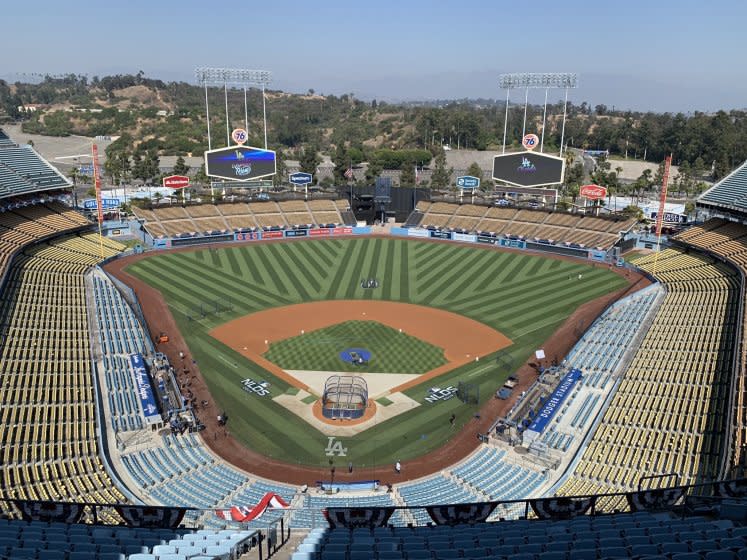MLB expected to present players with proposal to begin season in early July

Major league owners are expected to ask players Tuesday to agree to a regular season that would cover about 80 games. The Dodgers have not won a World Series championship in 32 years, and their manager believes victory would taste just as sweet after what would normally be considered half a season.
“This is something unprecedented,” Dave Roberts said Saturday. “To keep guys focused and together in mind and body, and then to win a championship, I see no reason why anyone should even entertain an asterisk.”
Under the owners’ plan, players would report to training camp in June and start an abbreviated season in early July. Teams would play regionally to minimize travel, so the Dodgers and Angels would play largely along the West Coast. Rosters would be expanded to account for the probable cancellation of the minor league season, and the postseason would be expanded too. Fans would not be admitted, at least at the start.
Owners could tweak some of those concepts, first reported by The Athletic, in a conference call Monday. The commissioner’s office would then begin what could be a contentious negotiation with the players’ union.
“I’m still hopeful,” Roberts said. “I don’t see how we can’t come to some consensus on both sides. Everyone will benefit. It’s time for the fans to have baseball in their homes. I think it can be a therapeutic and nice diversion.”
It is uncertain what alterations the league might propose in the event local authorities do not let teams play in their home ballparks, or a coronavirus outbreak occurs or recurs. It also is uncertain how the owners might propose to protect the health and safety of players and other personnel.
“I don’t think anything can be done until that [safety] can be guaranteed and we feel comfortable with it," St. Louis Cardinals pitcher Andrew Miller told ESPN. “We want to put a good product on the field, but that's totally secondary to the health of the players. We are generally younger and healthier, but that doesn't mean our staff is, that doesn't mean the umpires are going to be in the clear.
"It's not hard to get one degree of separation away from players who have kids who may have conditions, or other family members that live with them. I'm confident that before anything happens, we'll sort through all those issues.”
On the ESPN broadcast of the UFC fight Saturday, President Trump said: “Get the sports leagues back. Let's play. You do the social distancing and whatever else you have to do. But we need sports. We want our sports back.”
However, fighter Ronaldo Souza tested positive for the coronavirus, as did two of his cornermen. He was removed from the card Friday but seen on video Saturday mingling with others at the event.
Agent Scott Boras said MLB can learn from the experiences of baseball leagues underway in Taiwan and South Korea, and from soccer leagues around the world. Boras, who represents about 100 major league players, said none of his clients has expressed concerns about playing. However, he said, any player with a medical issue that might put him at risk should be allowed to choose whether he wants to play.
“These contracts aren’t servitude,” Boras said.
In March, owners and players agreed to extend the regular season through October if necessary and conduct the postseason in November. Boras would like MLB to do just that, with a longer schedule.
“There’s no reason I can see that, if you start in July and you have four months, we shouldn’t be playing 110 to 120 games, minimum,” he said. “That’s why we negotiated that extra month.”
That agreement also provided that the players would be paid on a prorated basis depending on the number of games played. The owners say that provision assumed fans would be in attendance, and if not the parties should negotiate lower salaries to account for the lack of revenue from tickets, food, drinks and merchandise. The players say the provision covers all scenarios.
Boras is wary that owners would try to cut salaries for regular-season games and then expand the postseason, where owners keep almost all of the money. He would, however, like to see a deal, and with it a season.
“For those people that we need to keep at home, we need baseball,” Boras said, “so they have some incentive to stay at home, so we don’t have social unrest.”

